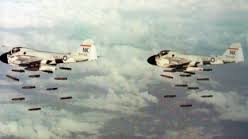Nguyen Van Tu asks if I’m serious. Am I really willing to tell his story — to tell the story of the Vietnamese who live in this rural corner of the Mekong Delta? Almost 40 years after guerrilla fighters in his country threw the limits of U.S. military power into stark relief — during the 1968 Tet Offensive — we sit in his rustic home, built of wood and thatch with an earthen floor, and speak of two hallmarks of that power: ignorance and lack of accountability. As awkward chicks scurry past my feet, I have the sickening feeling that, in decades to come, far too many Iraqis and Afghans will have similar stories to tell. Similar memories of American troops. Similar accounts of air strikes and artillery bombardments. Nightmare knowledge of what “America” means to far too many outside the United States.
“Do you really want to publicize this thing?” Nguyen asks. “Do you really dare tell everyone about all the losses and sufferings of the Vietnamese people here?” I assure this well-weathered 60-year old grandfather that that’s just why I’ve come to Vietnam for the third time in three years. I tell him I have every intention of reporting what he’s told me — decades-old memories of daily artillery shelling, of near constant air attacks, of farming families forced to live in their fields because of the constant bombardment of their homes, of women and children killed by bombs, of going hungry because U.S. troops and allied South Vietnamese forces confiscated their rice, lest it be used to feed guerrillas.

